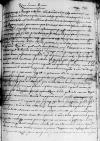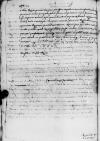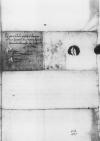Redditae sunt mihi a ⌊Peruhio⌋ redeunti ⌊⌋ Dominationis Vestrae Reverendissimae eisque ⌊venerabilis capituli⌋ ad Dominationem Vestram Reverendissimam scriptae erant inclusae, quibus lectis singularem in me gratiam Dominationis Vestrae Reverendissimae et venerabilium dominorum inconstantiam cognovi, cum mihi ⌊Romam⌋ eunti pecuniam, quae canonicis bonis litteris operam navantibus a venerabili capitulo debetur iusto tempore, se missuros promiserint.
Nunc, in eo tempore, quo solutio fieri debet, exsistente, inter se quasdam statutorum fingunt exceptiones excusationesque, quo minus mihi eam, quam iure debent, spretis etiam monitionibus Dominationis Vestrae Reverendissimae solvant, immo in usus suos convertant. Neque miror, Reverendissimae Domine, quod talia conari studeant, cum praelatorum et canonicorum apud ecclesiam tantus sit numerus, ut iis proventibus qui singulis accedunt, vitam sustentare nequeant, nisi id parum, quod nobis absentibus, deditur, sibi etiam vendicent, sed videant ipsi, in quem finem istud successu temporis deveniat, non enim erga me solum eiusmodi excusationibus utuntur, verum etiam erga venerabilem dominum ⌊Gasparum Hannovium⌋ nepotem Dominationis Vestrae Reverendissimae carissimum, qui a sex annis usque in hodiernum diem in negotiis et servitiis ⌊venerabilis capituli⌋ propriis sumptibus expediendis semper accuratissimus diligentissimusque fuit et adhuc est pro laboribus et benemeritis suis, statutis etiam bene solutis corpus praebendae a praedicto venerabili capitulo contra ius et fas sibi devagatur. Facile igitur Reverendissima Dominatio Vestra, quid inde eveniat, diiudicare potest.
Venerabilem dominum ⌊praepositum⌋ tamquam seniorem (etsi ipsimet ⌊venerabili capitulo⌋ satis superque hac de re scripserim, quarum copiam his inclusam Reverendissimae Dominationi Vestrae mitto) meis rogavi, venerabile capitulum promissi et debiti admonere velit, ne, si posthac alio modo per me monitum fuerit, impudenter me fecisse dicat. Excusationem Dominationis Vestrae Reverendissimae, quod ob eas, quas nepotibus ceterisque amicis facit, expensas me iuvare non possit, aequo animo ut feram meque domum conferam necesse est, cum adeo ab omnibus me destitum, video, ut ⌊Romae⌋ diutius manere non possim.
Negotium cum ⌊Alexandro⌋, Reverendissime Domine, in eo modo exsistit statu, ut nisi nos salvus conductus, de quo dominus ⌊Gaspar⌋
Dominationi Vestrae Reverendissimae prioribus suis scripsit, impediat, cum confirmatione regiae sententiae brevi sit optatissimum finem consecuturum opem ferente nobis atque ipsae iustitiae domino ⌊Iesu⌋, quemadmodum fusius et domini Gasparis litteris Dominatio Vestra Reverendissima intelliget.
Causam mortis ⌊iunioris reginae⌋ omnes in tota ⌊Germania⌋ ⌊reginam seniorem⌋ esse dicunt. Nova praeter haec alia modo sunt nulla, videlicet quod lanczgrabius Hessiae totum exercitum ducis Brunswicensis prostraverit ipsumque una cum filio captivum tenet. Commendo me gratiae, tutelae et patocinio Dominationis Vestrae Reverendissimae eamque ad annos quam plurimos salvam atque incolumem esse opto.
Enclosure:
Salutem.
Reverendi ac Venerabiles Domini.
Iam dudum annus elapsus est, quo mihi pecunia ratione studii numerari debuit, nihil tamen usque huc accepi. Quamobrem autem id fiat, causam aliam invenire possum nullam, quam quod ⌊venerabile capitulum⌋ mihi ab ecclesia discedenti centum marcas Prutenicas mutuo dederat nihilque ulterius se mihi debere iam existimat. Totidem vero marcas me a ⌊venerabili capitulo⌋ accepisse fateor, ea tamen ratione, cum venerabile capitulum unicuique canonico bonis litteris operam danti, quoad in studio fuerit, singulis annis sexaginta marcas impendere consuevit et eam, quae ad annum praeteritum pertinebat pecuniae summam, mihi ab ecclesia ⌊urbem⌋ versus eunti solvit eisque alias quadraginta, quae numerum centum marcarum expleverunt, adiunxit. Quae quidem quadraginta marcae ab illis sexaginta anni subsequentis detrahendae sunt, quo facto nonnihil adhuc pecuniae tum ex sequentis anni summa, tum etiam ex allodio, quod post mortem venerabilis domini ⌊Georgii Donner⌋ mihi obvenit.
Quare Dominationes Vestras obnixe peto, mihi id reliquum, quod debetur, quamprimum mittere vel saltem in manus reverendissimi domini nostri, domini ⌊episcopi Varmiensis⌋, deponere dignentur. Hoc si fecerint, id quod etiam ipsa aequitas suadet et fraterna caritas, dabitur vicissim a me opera, ut gratum hoc officium vitae compensetur in hac praesertim urbe ⌊Roma⌋, in qua secundum variarum rerum eventum frequenter occurrunt benemerendi occasiones plurimae.
Commendo me etc.



